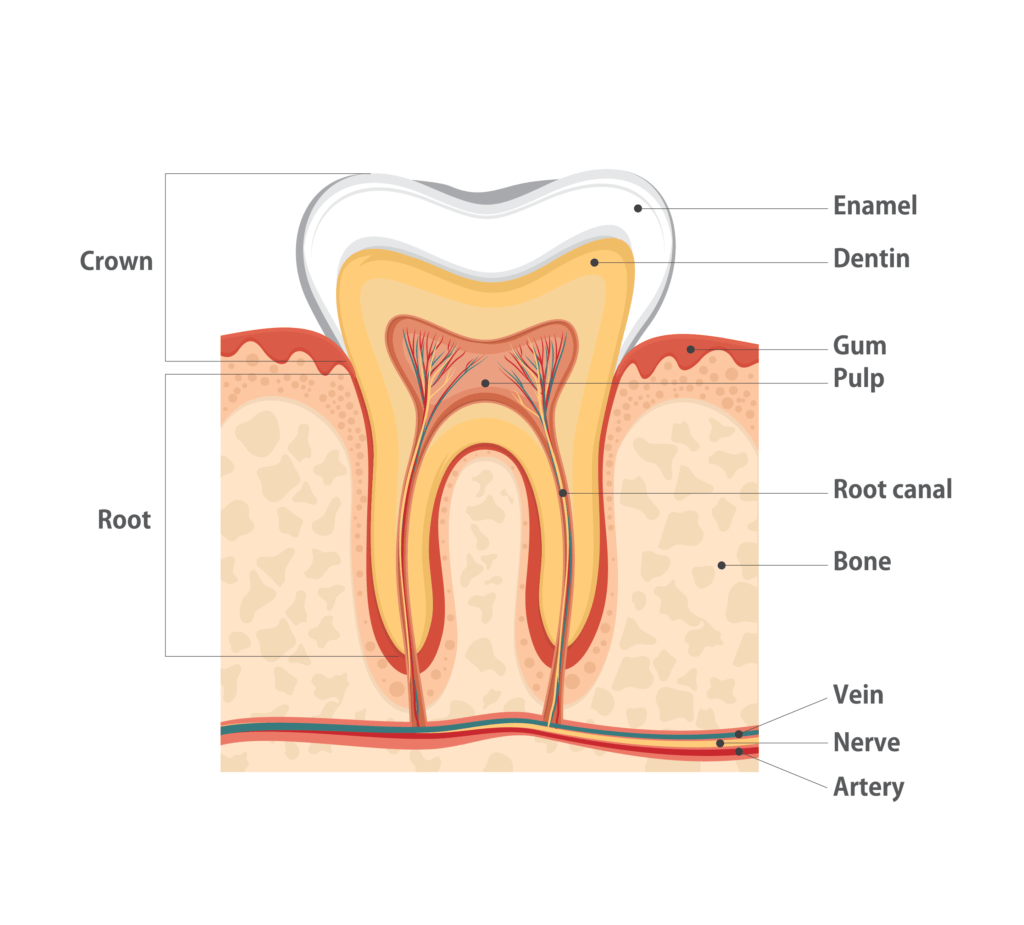If you’ve ever searched for dental care tips online, you’ll have seen articles and social media posts by people who claim that you can reverse tooth decay by yourself at home. They often say you can heal your own teeth and avoid having to get dental fillings through home remedies.
So is it true? Can you reverse tooth decay by yourself?
As a dentist who has treated thousands of patients and keeps up to date with the research, I can assure you that the short answer is “no”.
But I do have some good news for you: the long answer is “sort of.”
Quick tooth anatomy primerIt will help to understand some basic tooth anatomy as you read this article. The hard, white, mineral-rich outer layer of your teeth is called the enamel. The layer just below that is called the dentin, and it’s much softer and is more of a yellow colour. Cavities form on the enamel, and if left untreated, over time they will eat their way through to the dentin, and finally to the pulp and the root. I have some information below about the causes of cavities and how to prevent them. For now, let’s get back to explaining why and how you can sometimes reverse tooth decay. |
 |
It’s all about timing
What those “I cured my cavity at home” websites aren’t telling you is the level of damage that they had before the miraculous cure happened. These sites often show dramatic photos of severe cavities, not x-rays of the very early stages of decay they were actually experiencing.
The earliest stage of a cavity occurs when the enamel loses minerals (calcium, phosphate, and fluoride), and can sometimes show as a white spot on the tooth to the naked eye. At this point, the outer layer of enamel has become weak and soft.
Fortunately, demineralized enamel can—to an extent—be remineralized before a physical cavity (an actual hole) appears.
What do I about demineralization?
It’s really important to see your dentist if you suspect demineralization, because there may be more problems with your teeth than you can see or feel yourself.
Your dentist will probably tell you that these habits will help you fight demineralization:
- Improve your dental hygiene through proper brushing at least twice a day, flossing once a day, and using dental rinses. Use toothpastes and dental rinses contain remineralizing agents that help restore lost minerals. (I like Boka, MI Paste, and CariØ toothpaste brands.)
- Change your diet. Eat more fresh fruits and vegetables, sharp cheddar cheese, and fewer sugars and processed carbohydrates.
- Eliminate drinking acidic beverages over prolonged periods.
- Stop snacking between meals.
- Drink plenty of water.
- If you like to chew gum, chew a sugar-free gum containing xylitol.
Your dentist may also recommend adding a protective sealants over the deep grooves in your molars, which are very cavity-prone. Depending on how far the decay process has progressed, they may recommend other treatments as well.
Beware: decayed tooth enamel can’t be “re-grown”
The types of cells that make up your teeth can’t repair themselves after the tooth has fully developed. There are laboratory studies being conducted with stem cells to try and achieve regrowth, but for now it’s physically impossible.
Once a tooth has a true cavity (in the form of a hole), there is no feasible way to help the enamel grow back on your own. Instead, the cavity will gradually worsen.
You should have the cavity treated as soon as it’s diagnosed and while it’s as small as possible. When you do, your dentist can place a minimally invasive filling and preserve as much healthy tooth structure as possible.
But untreated cavities will expand to the point that they require larger fillings. Or worse, they will reach into the nerve chamber and create an abscess. What could have initially been treated with a modest restoration now becomes a situation requiring a root canal and a crown.
So what causes cavities anyway?
Cavities are caused by certain types of harmful bacteria in our mouths (there are beneficial and neutral bacteria as well). These harmful bacteria live by eating sugars and other carbohydrate-rich foods, and excrete the acids that damage tooth enamel.
If you’ve ever felt like your teeth are “coated”, or seen a yellowish film on your teeth, that’s a buildup of harmful bacteria. If you don’t brush your teeth well enough (you can learn how here), that soft film will harden within a day, and after that it can only be removed by a dental hygienist.
These bacteria thrive if the environment in your mouth is acidic. It doesn’t help that the ideal pH (acidity-alkalinity balance) of your mouth should be slightly alkaline (above 7.5 pH) in order to remineralize.
Your natural ally in the fight against tooth decay
Most people don’t know this, but our own saliva helps us fight tooth decay. Saliva is full of calcium and phosphate and will help neutralize acids in the mouth. This creates a more hostile environment to the bacteria that cause tooth decay, and can contribute to remineralization.
If you find that you experience “dry mouth” regularly, you should mention this to your dentist and your doctor. There are many reasons why your mouth can be drying out, and ideally it should be treated.
